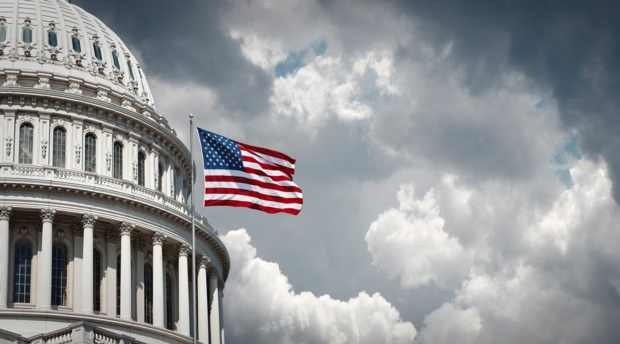American University Law Review Annual Symposium Discusses Democracy and the Law
Feb. 6, 2020

American University Law Review hosted its 69th annual symposium on Friday, Jan. 31. The topic was unavoidably relevant— Democracy and the Law: 2020.
“Everyone has a responsibility to be informed about the state of democracy,” said James R. Sullivan, 3L student and Volume 69’s senior symposium editor of American University Law Review. “Future lawyers and advocates, especially.”
Legal scholars across the nation engaged in discourse on campaign financing, online political speech, and modern voting issues. James Sample, law professor at Hoftra University, discussed the implications of legislative deference on modern elections. “The article that I’ve written for today’s symposium is an uplifting feel-good piece,” joked Sample. “It’s titled ‘Democracy’s Demise.’”
Ciara Torres-Spelliscy, professor at Stetson College of Law, noted a rhetorical shift in how the Supreme Courts view and define corruption. To hold politicians accountable, Torres-Spelliscy stresses the importance of going to voting booths. “The fate of American democracy is in all of our hands,” said Torres-Spelliscy. “Show up.”
AUWCl Professor Stephen Wermiel moderated the lunch panel covering online political speech. He suggested that this is where “the future meets the past.” Although there are well-developed rules regarding political speech and the First Amendment, the government has not put guidelines in place for use on social media. This discussion left students wondering if the aging Supreme Court Justices were prepared to contextualize the role of Facebook and other social media platforms in the political sphere.
Joseph Thai, professor of law at University of Oklahoma College of Law, spoke about Facebook’s “Speech Code,” and how it restricts speech and distorts democratic deliberation. He also noted that there was currently no scholarship written on these community standards.
David Hudson, law professor at Belmont University in Nashville, acknowledged the increase in online defamation suits that arise out of political campaigns. “There is license to make statements that you cannot use in a news story, but do so online, such as name calling or rhetorical hyperbole,” he said.
Another consideration brought forth by Evelyn Aswad, professor of international law at University of Oklahoma College of Law, were the United Nations global responsibility standards and their application to social media companies tackling online speech. “There is an expectation that corporate actors must respect human rights and treat this standard as a minimum,” she said.
“The aim of this year’s symposium, in classic law school fashion, is to leave those in attendance with more questions than answers,” said Sullivan. “This thought-provoking discussion should give them the tools to continue these conversations long after the symposium concludes.”